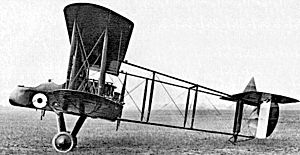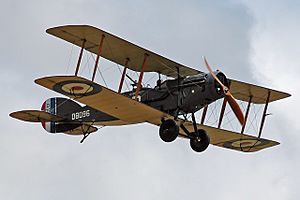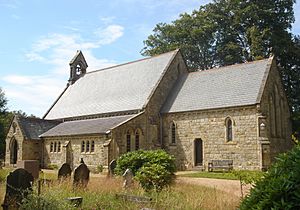James Scaramanga facts for kids
Quick facts for kids
James John Scaramanga
|
|
|---|---|
| Born | 25 July 1898 Reigate, Surrey, England |
| Died | 10 July 1918 (aged 19) France |
| Buried |
Aire Communal Cemetery
Pas-de-Calais, France] |
| Allegiance | |
| Service/ |
|
| Years of service | 1916–1918 |
| Rank | Lieutenant |
| Unit | No. 20 Squadron Royal Flying Corps, No. 22 Squadron RAF |
Lieutenant James John Scaramanga (born July 25, 1898 – died July 10, 1918) was a brave British air observer during the First World War. He was known as a "flying ace" because he helped shoot down twelve enemy aircraft. This was a big achievement for an observer. Sadly, he got his last victory after he was already badly hurt, and he died soon after. James came from a rich Greek family. Interestingly, his family had a connection to Ian Fleming, the author who wrote the James Bond books.
Contents
James Scaramanga's Family and Early Life
James John Scaramanga was born on July 25, 1898, in Reigate, Surrey, England. His parents were John George Scaramanga and Louisa Yeames Scaramanga. Some records say he might have been born in Redhill, Surrey, which is nearby.
By 1901, James lived at a large house called Tiltwood House in Worth, West Sussex. This house was a huge mansion with fifteen bedrooms! His Greek grandfather, George Emmanuel Scaramanga, had bought and made the house even bigger. When his grandfather passed away in 1897, the Tiltwood Estate was almost 500 acres. James's grandmother, Elizabeth Scaramanga, lived there until she died in 1933. After that, the estate went to James's uncle, Ambrose Scaramanga.
A Link to James Bond?
James Scaramanga's first cousin, George Ambrose Scaramanga (1911–1988), is thought to be the reason why Ian Fleming chose the name "Scaramanga" for the villain in his James Bond novel, The Man with the Golden Gun. This book was published after Fleming died. Fleming and George Ambrose Scaramanga went to school together at Eton College in the 1920s. They supposedly had an argument, and Fleming later used the name "Scaramanga" for his villain as a way to get back at him.
James Scaramanga's Military Service

James Scaramanga joined the Royal Flying Corps on December 28, 1916. He was assigned to No. 20 Squadron as an observer, starting as a second lieutenant the next day. At first, he flew in F.E.2 aircraft with his squadron. In August 1917, his squadron received new planes called Bristol Fighters. All twelve of Scaramanga's aerial victories happened while he was flying in a Bristol F.2b.
First Victories
Lieutenant Scaramanga got his first aerial victory on March 9, 1918. He was flying with Lieutenant Douglas Graham Cooke in a Bristol F2.b (C4605). They sent an Albatros D.V plane out of control over Comines, Nord, France. Just four days later, on March 13, 1918, he got another victory. From a Bristol F.2b (C4615), he and pilot Lieutenant Dennis Latimer sent a Pfalz D.III out of control over Comines-Wervicq.
Being Wounded and Returning to Fight
On April 11, 1918, James Scaramanga and his pilot, Canadian Major J. A. Dennistoun, were both seriously injured. They had to land their Bristol plane (B1275) near Neuve-Église, France, while under machine-gun fire from the ground. Their plane was destroyed.
After he recovered, Lieutenant Scaramanga was moved to No. 22 Squadron of the Royal Air Force on June 6, 1918. All of his next victories (from his 3rd to his 12th) were with Lieutenant John Everard Gurdon as his pilot. Also, his next seven victories (3rd through 9th) all happened while flying in the same Bristol F.2b (C989).
More Victories
On June 19, 1918, Lieutenant James Scaramanga had a very successful day, taking down three Fokker D.VII aircraft southeast of Armentières, France. Two of them were destroyed, and a third was sent out of control. On June 27, 1918, he sent a Fokker Dr.I out of control, again southeast of Armentières. This was his sixth victory.
Scaramanga got his seventh victory on July 1, 1918, when he sent a Pfalz D.III out of control over Armentières. He took down his eighth plane on July 4, 1918, when a Fokker D.VII was destroyed over Noyelles, north of Seclin, France. The lieutenant's ninth victory involved a DFW C plane that was destroyed north of La Bassée, France.
His last three victories (10th through 12th) all happened on the same day, July 10, 1918. He and his pilot Gurdon were flying in Bristol F.2b (C1003). They fought against three Pfalz D.III aircraft over Armentières-Lille, France. One was destroyed, and the other two were sent out of control.
James Scaramanga's Death
James Scaramanga was badly wounded in a dogfight and lost consciousness just before he helped shoot down his twelfth and final enemy plane on July 10, 1918. He woke up and, using his one good arm, shot down the attacking Pfalz D.III that was chasing them. He died that same day, soon after he and his pilot, Lieutenant John Everard Gurdon, landed. This was about two weeks before his twentieth birthday.
Scaramanga was buried at Aire Communal Cemetery in Aire-sur-la-Lys, France. His grave number is III. H. 25. He is also remembered on the Crawley Down War Memorial in Crawley Down, Sussex. This monument is located near the Church of All Saints. While the memorial itself doesn't list names, there is a special list of names of those who died at the church. Even though Lieutenant James John Scaramanga had twelve aerial victories and was seriously wounded twice (the second time fatally), he does not seem to have received any special awards for his bravery.
His pilot, Lieutenant Gurdon, survived the fight that killed Scaramanga. On August 3, 1918, it was announced that Gurdon had been given the Distinguished Flying Cross. After he recovered, Gurdon went on to get five more victories in August 1918, bringing his total to 28. He also became a captain.
Gallery of Aircraft James Scaramanga Helped Down
-
Pfalz D.III
Victories 2, 7, 10–12 -
Fokker D.VII
Victories 3–5, 8 -
Fokker Dr.I
Victory 6
 | Jessica Watkins |
 | Robert Henry Lawrence Jr. |
 | Mae Jemison |
 | Sian Proctor |
 | Guion Bluford |







